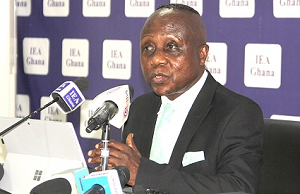The Institute of Economic Affairs (IEA) Ghana has recommended to the government to start building strong economic and financial buffers to support the economy to withstand future external shocks and emergencies.
It said a strong economic buffer should entail a sizable fiscal space, cushion for reserves, sinking fund for debt repayments, contingency fund and a robust financial sector to support economic development, adding that it should be part of the country’s home-grown policies which would run parallel to the prescriptions from the International Monetary Fund (IMF).
At a press conference in Accra last Monday, the Director of Research at the IEA, Dr John Kwakye, said the coronavirus (COVID-19) pandemic and the Russia-Ukraine war had exposed the country’s existing vulnerabilities, taking it back to the IMF.
“We need to learn lessons from this experience. Most importantly even beyond the IMF programme requirements.
“We must begin to build strong economic and financial buffers, including a sizable fiscal space, a cushion of reserves, a sinking fund to support debt repayments, a contingency fund to cater for economic shocks and emergencies, and a robust financial sector,” he added.
Temporary relief
According to Dr Kwakye, the IMF programme, like the previous deals can only bring the country temporary relief in terms of macroeconomic and financial stability and a boost in market confidence and policy credibility.
He said the programme was geared towards achieving targets and fulfilling goals that it determined appropriate in dealing with the country’s economic crisis rather than harnessing the nation’s full potential.
Dr Kwakye said the country required quantum jumps in its development and not what he described as little incremental changes embodied in IMF programmes.
According to him, the country needed to build and entrench its own policy credibility without an IMF anchor, adding that the long-term economic progress and survival of the nation depended on leveraging its abundant domestic resources to support home-grown, inclusive and cross-cutting policies anchored by financial discipline and a transformational strategy.
In line with that, Dr Kwakye said it would be helpful to have a development plan that spelt out broad national priorities and strategies to achieve those objectives.
“No longer should we have party manifestos often characterised by experimentation and wayward policies that cater for individual and party interests rather than the national interest.
“The bottom line is that the country should take its development destiny into its own hands. That is the only way to make this 17 IMF programme the end of all programmes,” he added.
Programme
The research director further said that the IMF programme placed the country’s economic managers in a straitjacket with very little room for policy discretion or manoeuvre.
Describing it as an auto-pilot-like programme, he said it limited the opportunity to intervene in the economy to respond to changing dynamics.
“The programme is subject to considerable risks. The baseline projections in the programme are predicated on benign geopolitical environment and swift progress in implementing the comprehensive debt restructuring and plans to address the large stock of domestic arrears,” Dr Kwakye said.

